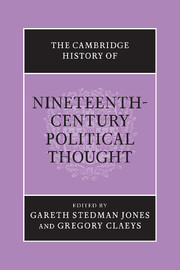Book contents
- Frontmatter
- Contents
- Contributors
- Acknowledgements
- Introduction
- I Political thought after the French Revolution
- II Modern liberty and its defenders
- III Modern liberty and its critics
- IV Secularity, reform and modernity
- 18 Church and state: the problem of authority
- 19 The politics of nature
- 20 Conservative political thought from the revolutions of 1848 until the fin de siècle
- 21 Modern liberty redefined
- 22 Political economy
- 23 German socialism and social democracy 1860 –1900
- 24 Russian political thought of the nineteenth century
- 25 European political thought and the wider world during the nineteenth century
- 26 Empire and imperialism
- Epilogue
- Biographies
- Bibliography
- Index
24 - Russian political thought of the nineteenth century
from IV - Secularity, reform and modernity
Published online by Cambridge University Press: 28 July 2011
- Frontmatter
- Contents
- Contributors
- Acknowledgements
- Introduction
- I Political thought after the French Revolution
- II Modern liberty and its defenders
- III Modern liberty and its critics
- IV Secularity, reform and modernity
- 18 Church and state: the problem of authority
- 19 The politics of nature
- 20 Conservative political thought from the revolutions of 1848 until the fin de siècle
- 21 Modern liberty redefined
- 22 Political economy
- 23 German socialism and social democracy 1860 –1900
- 24 Russian political thought of the nineteenth century
- 25 European political thought and the wider world during the nineteenth century
- 26 Empire and imperialism
- Epilogue
- Biographies
- Bibliography
- Index
Summary
The epoch of Alexander I
The first years of the nineteenth century in Russia were a time of great hopes. The new emperor, Alexander I, hated the arbitrary despotism of his assassinated father, Paul I, and vowed to make Russia a law-abiding state, a legitimate representative of universal civilisation, playing an important part in European affairs and realising thereby a universally significant imperial mission. The educated strata of the Russian society shared this mood. They felt that a great historic change was imminent and wanted to participate in it. Expectation of a new beginning united the old-fashioned rationalists of the Enlightenment with the members of the mystical freemasonry, known as Illuminati, or Martinists.
- Type
- Chapter
- Information
- The Cambridge History of Nineteenth-Century Political Thought , pp. 811 - 834Publisher: Cambridge University PressPrint publication year: 2011

